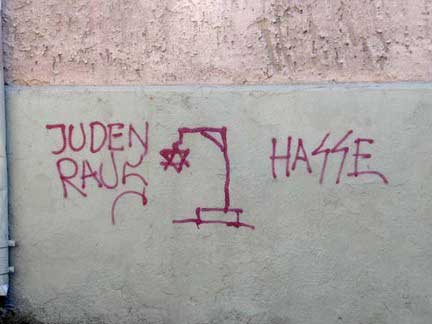Dr. Manfred Gerstenfeld
Israel National News
August 21, 2013
The EU boycott should not have been a surprise. Interview with Susanne Urban, a German historian, who elucidates on the situation.
“Anti-Semitism was officially delegitimized in Germany after its surrender in 1945. This happened first in public areas such as politics, economy, culture, art and later on in society at large. Public debates and the social environment show however that since the late 1990s, anti-Semitism is expressed again more openly in manifold variations. Contemporary anti-Semitism has a solid base in the German mainstream.”
Dr. Susanne Urban, a German historian, heads the Historical Research in the International Tracing Service (ITS) Bad Arolsen. Before that, she worked for five years at Yad Vashem. She has also published a number of books.
“Several studies in recent years gave us more insight into levels of German anti-Semitism. In 2008, all parliamentary parties agreed to appoint an expert group. It was charged with obtaining an understanding of how far anti-Semitism had permeated German society and how to combat it more effectively. The ten experts were also asked to present recommendations regarding education and training of educators.
“The assignment stressed that findings concerning levels of anti-Semitism should be connected to questions about Germany’s democratic stability. The experts also focused on post-Holocaust anti-Semitism and Muslim anti-Semitism.
“In August 2011, their report was published and presented. It stressed the importance of confronting ‘secondary anti-Semitism.’ One major aspect of this is that people refuse responsibility for the Holocaust. This reflects a variety of widespread opinions. Included is that Germany is the victim or even hostage of survivors and that Holocaust compensation payments are sometimes denounced as a robbery committed by ‘The Jews.’
“This opinion is fueled further nowadays by those Germans who promote multiple types of self-victimization. This phenomenon expresses itself for instance as: ‘We were victims too but never got compensation.’ Victims and perpetrators are often inverted. In 2008, more than two-thirds of Germany’s population were annoyed to different degrees by recollections of Nazi crimes and their victims.
“The study also found that in 2010, secondary anti-Semitism was shared by 40% of Germany’s population. An identical percentage considered that Israel behaves like Nazi Germany today. Secondary anti-Semitism is not specific to Germany, but is found in high percentages in Poland and Hungary as well. In the United Kingdom and the Netherlands, these figures are much lower.
“Anti-Zionism as one variety of anti-Semitism often manifests itself as ‘criticism of Israeli politics, strategies and actions.’ It is found in all spheres of German society, be it Leftist or Rightist, Muslim or Christian. Anti-Zionism and secondary anti-Semitism often overlap for instance by making comparisons between Nazis and Israeli politics or between Holocaust victims and the Palestinians. This is also used to deny contemporary responsibility for Germany’s history or commemoration of the victims. Anti-Zionist attitudes do not differ if one is ideologically on the left, right, or a liberal.
“The older a person gets, the more primary and secondary anti-Semitism gain ground. Anti-Semitic prejudices and images decline from Middle to High schools. Males show more prejudice than females concerning both primary and secondary anti-Semitism. But there are no such differences regarding anti-Zionism

